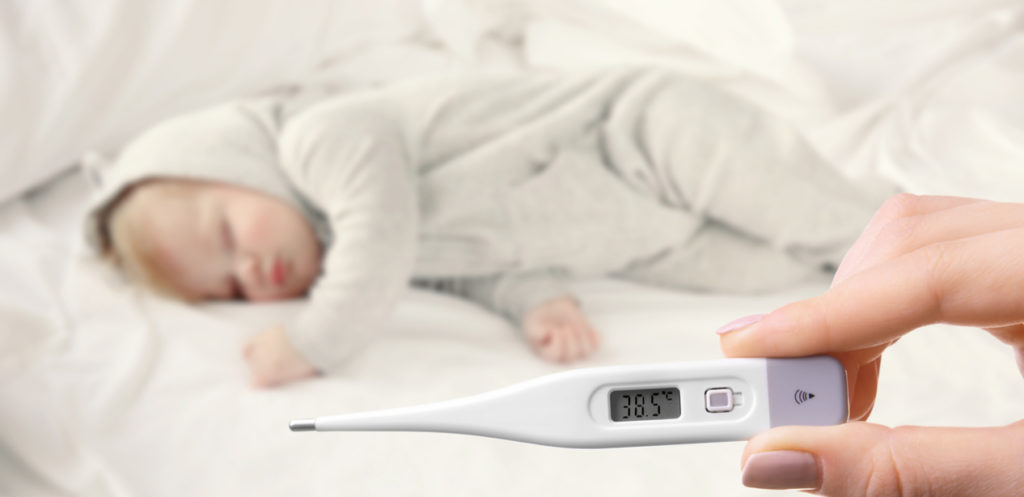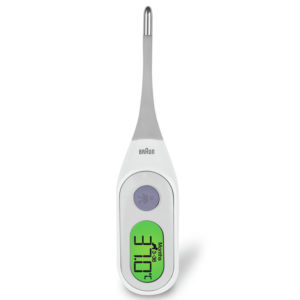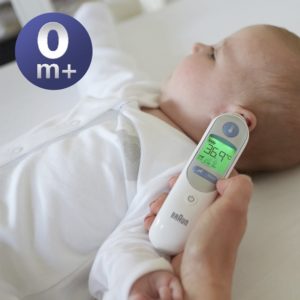Most parents get super worried when their baby’s temperatures are high. Especially if this lasted for a few hours, or worse, days. A fever can leave our babies weary, irritated, agitated, and it can make them lose their appetite to eat. To ease your fears, we prepared this guide for you to understand everything on baby fever. From what it is, how to understand it, and how to treat it.
What is baby fever?
A fever is a temporary increase in the body’s temperature. Usually, it happens as a reaction for another illness. Also, it can be a sign that there is something unusual going on with the body, like a virus or inflammation.
Regular or normal body temperature differs based on age. For adults, the normal temperature is 37.2 Celsius. As for babies, we can divide this into 3 different age groups:
-
1| From birth till 3 months old:
- A fever starts from 38 degrees and higher.
-
2| Between 3 months old to 3 years old:
- We can tell they are feverish if their temperature is 39 or higher.
-
3| Children from 3 years and older:
- It starts from 39.5 degrees or higher.
What causes a fever?
There are many things that can cause a fever, and this goes for both children and adults. One of the most common causes are viral infections, like a regular cold. Where the symptoms are a runny nose, a sore throat, and a cough. Such illnesses might take from two to four days to heal. Usually, there is no need to pay a doctor a visit when this is the case.
In addition, there are other common viral infections that can cause a baby fever such as gastritis, diphtheria virus, or roseola. If your child caught one of them, you can keep the fever under control with off-the-counter medicine such as Paracetamol and Ibuprofen. Furthermore, your child will need plenty of rest and fluids to recover.
However, if a fever lasted for more than 3 or 4 days, then you must visit a doctor. Especially if the fever is the only symptom. This visit will help you understand why the fever is happening. Also, depending on the cause, your pediatrician will prescribe the right antibiotics and medication.
To sum up, these are the things that can cause a baby fever:
- – A virus infection.
- – A flu or a cold.
- – Middle ear infection.
- – Tonsillitis.
- – Strep throat infection.
- – A urinary tract infection.
How to take a child’s temperature?
Some experts suggest a rectal thermometer to take children’s temperature. However, most parents try their best to avoid this method. Parents lean more towards less irritating ways which also give similarly accurate readings.
The best alternative to take temperature for babies from birth till the age of three months is an ear thermometer. When you do it correctly, it will give an accurate reading with only a margin of half a degree. And this is the way that most pediatricians recommend.
As for older children, an oral thermometer is the best choice. It gives accurate reading for their body temperatures. However, many doctors still prefer ear thermometers the most even for older patients.
Remember to check their surroundings.
Babies around the age of 3 months old adapt differently to their surroundings. In some cases, your baby might feel warmer than usual, but there are no symptoms or signs of illness. What doctors suggest here is to lose a layer of clothing and take his or her temperature again after 10 minutes. This way you will have a more accurate reading.
Can we treat a fever?
Treating a fever depends on what is causing it. For instance, if it is caused by a viral infection like a cold. Then, the fever is a sign that the body is fighting the virus. Most doctors agree that there is no need for medication in this case.
On the other hand, if their temperature is high and accompanied by weariness or pain. Then it only makes sense to give them medication. But before doing so, make sure you consult your pediatrician. Your doctor will help you know the right dosage and frequency to treat your baby.
Moreover, keep in mind the surroundings and how they affect your child’s temperature. For example, don’t over cover your baby if he or she is feverish. That will only make their temperatures higher.
Try a warm bath
Giving your baby a lukewarm bath will warm them up without increasing their body temperature greatly. It will also help their body temperature to lower as it will strengthen their blood circulation. Experts recommend giving children their meds, and follow that with a nice warm bath. This will ensure your baby recovers quickly.
A sponge bath
Another thing you can do to lower your baby’s temperature is a warm sponge bath. This comes in handy for kids who are too tired to get into a bathtub. Get a spong, some warm water, and a little vinegar, and wash your baby’s body with it. This is one of the most common home remedies for fever. The vinegar will help suck the extra heat from the body thus lowering its temperature.
It’s not just the fever, it’s what comes with it
Most experts don’t consider a fever dangerous. What they worry about is what comes with a fever or what follows it.
-
– Dehydration.
- When a child’s temperature is high, they lose a lot of fluids. Dehydration is one of the dangerous issues that accompanies a fever.
-
– Febrile seizures
- Those are fits that can happen when a child has a fever. They most often happen between the ages of 6 months and 3 years. The best thing to do here is to keep an eye on your child’s temperature. Once it spikes, start using home remedies or medications to lower it.
How to protect my baby from getting a fever?
Most parents want to protect their children against fever. But the truth is it is inevitable. What we can do as parents is:
- 1| understand what a fever is.
- 2| know the causes.
- 3| learn how to accurately take temperatures.
- 4| have the medications ready for whenever.
- 5| always check with your pediatrician.
With these steps, you will be able to treat your baby’s fever quickly. They might be easier said than done, but this is the best we can do for our little ones.
Remember, being prepared and educated is half way through your child’s protection!








